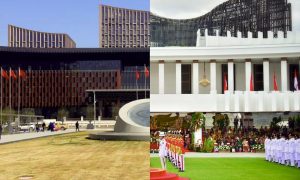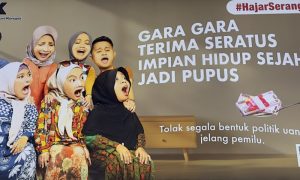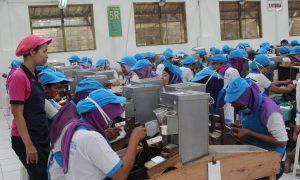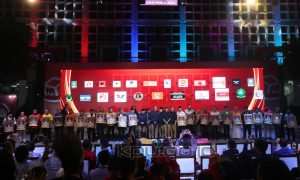On 28 July 2024 Muhammadiyah, Indonesia’s second largest Islamic organisation, officially announced that it would accept an offer of mining concessions from President Joko Widodo’s government. This followed the decision of the nation’s largest Islamic organisation, Nahdlatul Ulama (NU), which accepted their concession a month earlier.
Opponents within and outside both organisations have criticised their decisions to accept the mining concessions. Such criticism was often expressed on environmental grounds: NU and Muhammadiyah should not engage in mining activities, critics said, since doing so would mean depriving local communities—including those where their followers live—of their economic and communal rights.
Another line of argument against the adoption of the mining concessions is that once NU or Muhammadiyah agreed to accept them, it would endanger their reputation as independent and democratic civil society organisations.
Former president and NU leader Abdurrahman Wahid thought that NU’s autonomy from the state was necessary because the organisation seeks to promote “social transformation on a more complete and fundamental level.” He further defined social transformation within NU to include: freedom of speech, an impartial legal system, and economic and social equality. Similar sentiments were also expressed by Amien Rais as Muhammadiyah general chairman during the mid-1990s, when he stated that he wished to transform Indonesia’s leading modernist Muslim organisation into a pro-reform and pro-democracy movement.
As Robin Bush has written, by the mid-1990s many young NU activists responded to Wahid’s increasingly oppositional position to the Suharto regime by developing a “civil society discourse” comprising three elements: NU autonomy vis-a-vis the state; opposition to conservative and radical Islamism; and the promotion of pluralism and tolerance.
NU-affiliated NGOs like the Institute for the Study and Development of Human Resources (Lakpesdam) regularly sponsored workshops featuring NU’s promotion of pluralism, religious tolerance, and human rights, alongside coursework on political education and participation, all directed to promote NU’s civil society discourse to a new generation of NU activists throughout Indonesia.
After Indonesia’s democratic transition, NU and Muhammadiyah resumed their political activism by founding political parties: the National Awakening Party (PKB) for NU and the National Mandate Party (PAN) for Muhammadiyah. Politicians from both organisations received ministerial appointments and participated in national and regional legislative elections. From 1998 until 2014, both participated in national politics through the two parties, while contributing to civil, democratic political discourses in Indonesia.
The price of patronage
However, the relationship between the two religious CSOs and the state has changed under the Widodo presidency. Under pressure to counter the narratives of hardline Islamist groups like the Islamic Defenders Front (FPI), Jokowi made NU his primary partner to counter FPI-like groups and to promote a “moderate” Indonesian Islam both domestically and worldwide.
Over his decade-long presidency Widodo has bestowed extensive patronage towards NU clerics and politicians. This patronage has taken the form of political appointments (e.g. Vice President Ma’ruf Amin, Minister of Religious Affairs Yaqut Cholil Qomas, and others) as well as financial benefits (e.g. subsidies toward NU-run pesantren boarding schools, credit facilities for shari’a-based cooperatives and rural financial institutions, and more).
During Widodo’s second term (2019––2024) NU received even more state patronage from the Religious Affairs Ministry, now under control of Minister for Religious Affairs Yaqut Cholil Qomas, who is the brother of NU chairman Yahya Cholil Staquf. Such patronage has included financial support towards construction of nearly two dozen NU-affiliated universities; a religious moderation program that supports NU preachers and lecturers to promote “moderate Islam” in other ministries and state-owned enterprises suspected of being infiltrated by “radical’’ Islamic preachers and groups; and various state projects directed to support NU and its various affiliates (badan otonom).
This patronage has come at the price of NU’s ability to criticise, among other things, the recent legislation pushed by the Widodo administration that critics say has contributed to Indonesia’s ongoing democratic regression. This includes the 2019 revisions to anti-corruption laws that significantly weakened Indonesia’s anti-corruption commission, and the 2023 Criminal Code, which curtails freedom of expression and the rights of religious minorities and LGBTQ people.
Several NU public intellectuals, including prominent advocates of the organisation’s “civil society discourse” during the late 1990s and early 2000s, are now defending the Widodo administration’s policy and priorities, contradicting their earlier support for liberal democratic norms. Ulil Abshar Abdalla, co-founder of the Liberal Islam Movement (Jaringan Islam Liberal or JIL) and formerhead of NU’s Lakpesdam think tank, wrote the day after the February 2024 presidential elections that the victory of Prabowo Subianto and Gibran Rakabuming Raka showed that the majority of Indonesians wanted to continue President Widodo’s policies. He claimed that the results showed that Indonesians “have other pressing interests” than safeguarding democracy, which he dismissed as an idea expressed primarily by “a few middle-class academics”.
My recent conversations with sources within NU have confirmed that following Ulil’s lead, NU is in the process of revising its position on state–civil society relations. Instead of being an independent and autonomous CSO—like what Wahid and other NU activists were advocating in the 1990s—NU now views itself as an integral partner of the Indonesian state. In the new mindset, NU, as an ulama-led organisation, is mandated by Islamic teachings “to assist and defend” the state from any potential threats, whether from radical Islamists or from other civil society actors who express critical views against the state and its policies. Meanwhile, the earlier NU ethos pioneered by Wahid is dismissed, according to my sources, as an idea inspired by liberal Western political thought that is not applicable to the contemporary Indonesian socio-political context.
It was within this context that in June 2024 NU formally announced its acceptance of a coal mining concession offered by the Jokowi administration by the then investment minister Bahlil Lahadalia. NU chairman Yahya Cholil Staquf publicly stated that his organisation agreed to accept the concession because “it needed all available revenue sources to fund the [its] activities—as long as they are religiously permissible (halal)”.
Indonesia’s killer commodity
The kretek cigarette industry and its devastating public health impacts are sustained via a huge apparatus of labour, and appeals to cultural nationalism
Prabowo has few similarly close relations with NU figures (though he has won the endorsement of senior NU officials, such as the organisation’s former chair Said Aqil Siradj, in his past presidential campaigns). His landslide victory in the 2024 Indonesian presidential election, and the overwhelming support from NU voters towards Prabowo, was largely attributed to Widodo’s tacit endorsement of his campaign, which led to the NU leadership supporting him as well. Accepting the state’s offer of mining concessions, my enquiries have suggested, was driven by NU leaders’ belief that mining income would be substantive enough to offset any potential downturns in state patronage from Prabowo.
Muhammadiyah takes the NU path
Muhammadiyah’s decision to accept mining licences is more puzzling. Unlike NU, Muhammadiyah is not considered a close ally of the outgoing president. It has either publicly opposed, or at least raised serious concerns about, many of Widodo’s major legislative initiatives, including the 2019 amendments to the Anti-Corruption Law, the 2020 Omnibus Law on Job Creation, and the 2023 Criminal Code. Muhammadiyah leaders have frequently issued statements criticising ethical and legal misconduct by Widodo and other senior officials.
Most recently, in November 2023 former KPK chief and current Muhammadiyah national board member Busyro Muqqodas declared that the Constitutional Court (MK) ruling that allowed Widodo’s son Gibran Rakabuming Raka to stand for the vice presidency was a “poison affecting Indonesian democracy”. Muhammadiyah’s Law, Human Rights and Philosophy Council, which Busyro chairs, also issued a statement declaring that former MK chief justice Anwar Usman ought to be “dishonourably discharged from his position” for committing major violations of the MK’s code of ethics.
Sources close to the Muhammadiyah national board I recently interviewed revealed that the board had received significant pressure from the presidential palace to accept its offer of mining concessions, through one of the board’s members Muhadjir Effendy, who also serves in Widodo’s cabinet as Coordinating Minister for Human Development and Cultural Affairs. According to these sources, Muhadjir forwarded Widodo’s message to the leadership board, stating that Muhammadiyah must accept this concession because it would otherwise be considered as a personal insult by the president, who feels he has done a great deal to support the “moderate” Islam promoted by both Muhammadiyah and NU. The message concluded that if Muhammadiyah continues to refuse the offer of mining concessions then it will not receive any state patronage—especially cabinet appointments—under the Prabowo administration.
Muhadjir, according to my contacts, also made a personal appeal to other Muhammadiyah board members, saying that he was the only person seeking to ensure that organisation still gets the kind of political benefits—both high-level appointments and other state patronage—from Widodo (even if the amount was much less than what NU received). For instance, Muhadjir’s ministerial office has run its own religious moderation program, staffed by Muhammadiyah activists and separate from the main moderation programs run by the NU-controlled Ministry of Religious Affairs. Given these considerations, Muhadjir implored other Muhammadiyah leaders to consider whether they really want to risk their organisation being left with nothing under Prabowo if they dare to refuse the mining concession offer. Due to these considerations, the leadership board finally decided to accept the concession as a “hedging” tactic to ensure that they will not lose favour of the outgoing president.
Muhammadiyah’s leadership also believes that unlike Widodo, who has primarily aligned himself with NU when it comes to promoting “moderate” Islam, Prabowo is more willing to accommodate Muhammadiyah, given his past close relations with the organisation’s figures. Hence, they expect him to give them ministerial and other key appointments. Muhammadiyah leaders are very keen to regain several ministries that its politicians have historically been appointed in the past, particularly the education ministry. Hence, its decision to accept the mining concessions is part of a ”pay-to-play” strategy to be in line for ministerial and other high-level appointments under the incoming administration.
Conclusion
Muhammadiyah and NU’s decision to accept mining concessions is part of a process of political bargaining both organisations are engaged in with Indonesia’s political establishment in anticipation of future appointments and patronage. For both organisations, their decision is a rational measure to retain their political influence and safeguard their financial interests amid the uncertainties surrounding the ongoing presidential transition.
Their decision to bargain with the state and accept the mining concessions has nonetheless diminished their credentials as independent civil society organisations — particularly among their own activists. It also raises serious questions about whether in the long run, both organisations will be able to retain their autonomy as civil society organisations and their willingness to speak out strongly against decisions made by the Prabowo administration that may have adverse effects not only on NU and Muhammadiyah’s constituencies, but on Indonesia’s democratic norms and institutions.
 Facebook
Facebook  Twitter
Twitter  Soundcloud
Soundcloud  Youtube
Youtube  Rss
Rss 






